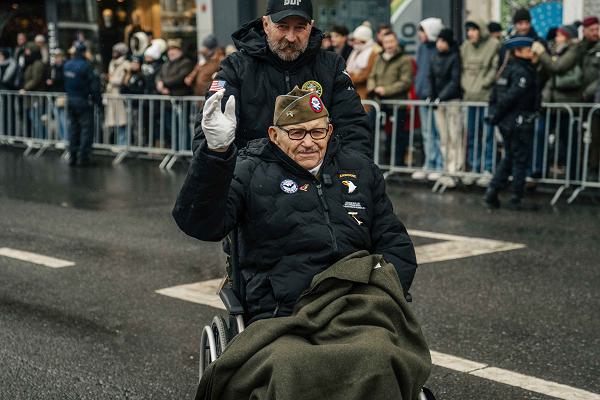
Bastogne, Belgium. (December 14, 2024): In this photo by 1st Lieutenant Dalton Worley, Soldiers assigned to the 101st Airborne Division escort World War II veterans during a parade marking the 80th anniversary of Bastogne and the Battle of the Bulge. In their nineties now, this is likely the last chance to personally honor these members of the 101st Airborne Division (Air Assault) for its defense of the city and region from the German offensive during World War II. In the Battle of the Bulge, between December 16, 1944, and January 25, 1945, the United States suffered well over 80,000 casualties, including an official Army count of 19,246 dead and more than 23,000 American troops taken prisoner.
Perhaps suffering from a sense of overconfidence, most allied troops felt the war was practically “over in 44” and many even expected to be home for Christmas. Meanwhile, Hitler had other plans. The Further was secretly massing an attack force to launch a winter offensive through a weak point in the Allied lines in the Ardennes forest. The Nazi goal was to seize Antwerp, Belgium which would drive a wedge between the British army to the north from the American army in the south. Although Hitler did not expect this attack would win the war, he believed the Americans would be more likely to negotiate peace on favorable terms.
Under cover of night and total radio silence, more than 200,000 German troops and nearly 1,000 tanks launched their desperate attack that famously “bulged” the Allied lines. Although the Americans were initially caught by surprise, they stubbornly held onto the critical road junctions of St. Vith and Bastogne which were critical to the enemy. It was here that American tankers and paratroopers found themselves surrounded as they fought off repeated attacks. Despite freezing conditions, dwindling food, and running out of ammunition, the “Screaming Eagles” refused to budge. In one of the most famous quotes of the war, the acting commander of the 101st Airborne Division in Bastogne was summoned by his German adversary to surrender, he simply responded, "Nuts!"
The siege was lifted the day after Christmas when elements of General George Patton’s Third Army liberated the town. The courage and tenacity of the 101st contained the “bulge” and eventually drove the Germans back towards their homeland and defeat. Americans owe a tremendous debt to these brave warriors who, despite overwhelming odds, stood their ground and sent helped turn the tide of the war.


